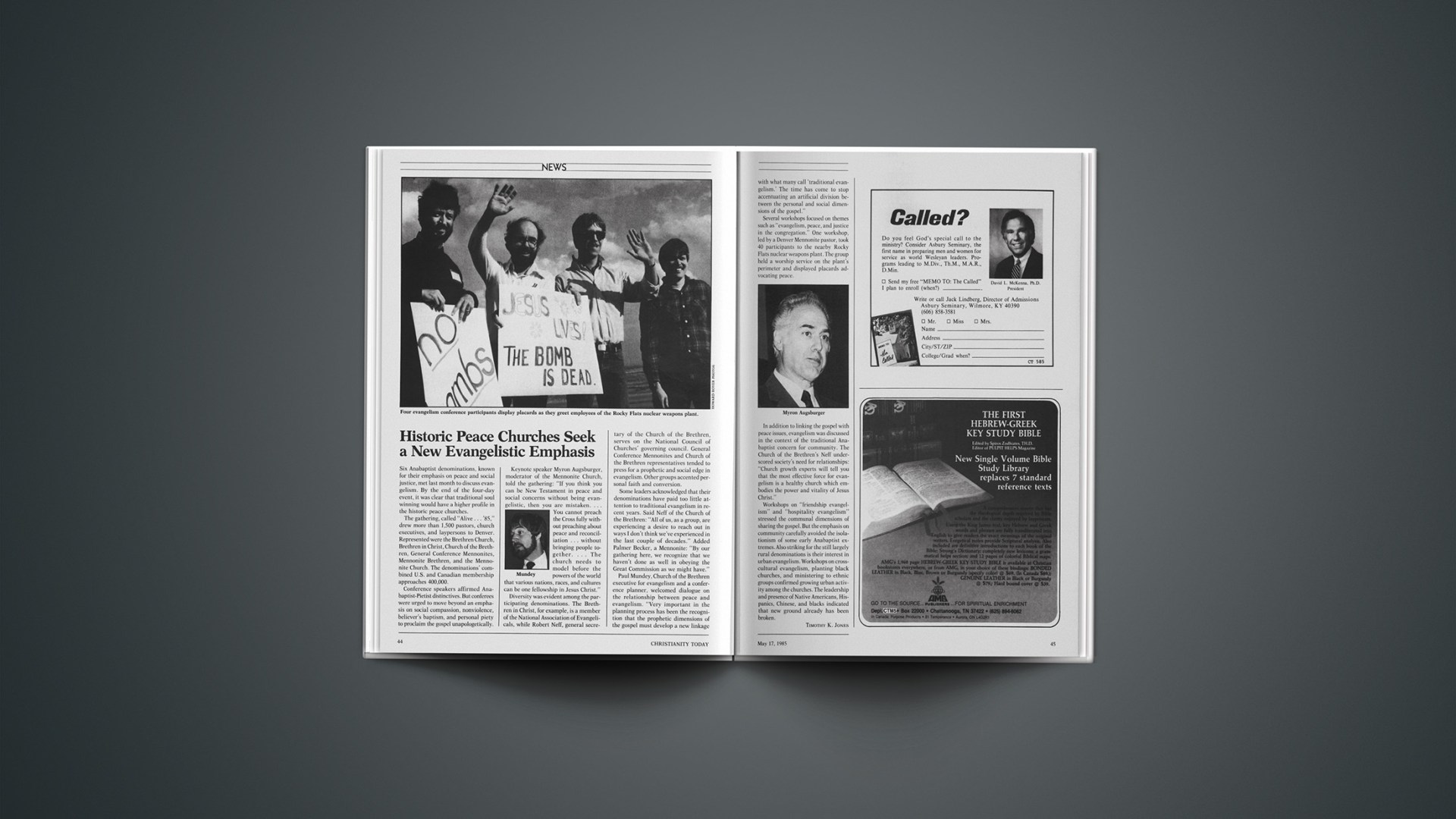Six Anabaptist denominations, known for their emphasis on peace and social justice, met last month to discuss evangelism. By the end of the four-day event, it was clear that traditional soul winning would have a higher profile in the historic peace churches.
The gathering, called “Alive … ’85,” drew more than 1,500 pastors, church executives, and laypersons to Denver. Represented were the Brethren Church, Brethren in Christ, Church of the Brethren, General Conference Mennonites, Mennonite Brethren, and the Mennonite Church. The denominations’ combined U.S. and Canadian membership approaches 400,000.
Conference speakers affirmed Anabaptist-Pietist distinctives. But conferees were urged to move beyond an emphasis on social compassion, nonviolence, believer’s baptism, and personal piety to proclaim the gospel unapologetically.
Keynote speaker Myron Augsburger, moderator of the Mennonite Church, told the gathering: “If you think you can be New Testament in peace and social concerns without being evangelistic, then you are mistaken.… You cannot preach the Cross fully without preaching about peace and reconciliation … without bringing people together.… The church needs to model before the powers of the world that various nations, races, and cultures can be one fellowship in Jesus Christ.”
Diversity was evident among the participating denominations. The Brethren in Christ, for example, is a member of the National Association of Evangelicals, while Robert Neff, general secretary of the Church of the Brethren, serves on the National Council of Churches’ governing council. General Conference Mennonites and Church of the Brethren representatives tended to press for a prophetic and social edge in evangelism. Other groups accented personal faith and conversion.
Some leaders acknowledged that their denominations have paid too little attention to traditional evangelism in recent years. Said Neff of the Church of the Brethren: “All of us, as a group, are experiencing a desire to reach out in ways I don’t think we’ve experienced in the last couple of decades.” Added Palmer Becker, a Mennonite: “By our gathering here, we recognize that we haven’t done as well in obeying the Great Commission as we might have.”
Paul Mundey, Church of the Brethren executive for evangelism and a conference planner, welcomed dialogue on the relationship between peace and evangelism. “Very important in the planning process has been the recognition that the prophetic dimensions of the gospel must develop a new linkage with what many call ‘traditional evangelism.’ The time has come to stop accentuating an artificial division between the personal and social dimensions of the gospel.”
Several workshops focused on themes such as “evangelism, peace, and justice in the congregation.” One workshop, led by a Denver Mennonite pastor, took 40 participants to the nearby Rocky Flats nuclear weapons plant. The group held a worship service on the plant’s perimeter and displayed placards advocating peace.
In addition to linking the gospel with peace issues, evangelism was discussed in the context of the traditional Anabaptist concern for community. The Church of the Brethren’s Neff underscored society’s need for relationships: “Church growth experts will tell you that the most effective force for evangelism is a healthy church which embodies the power and vitality of Jesus Christ.”
Workshops on “friendship evangelism” and “hospitality evangelism” stressed the communal dimensions of sharing the gospel. But the emphasis on community carefully avoided the isolationism of some early Anabaptist extremes. Also striking for the still largely rural denominations is their interest in urban evangelism. Workshops on cross-cultural evangelism, planting black churches, and ministering to ethnic groups confirmed growing urban activity among the churches. The leadership and presence of Native Americans, Hispanics, Chinese, and blacks indicated that new ground already has been broken.










